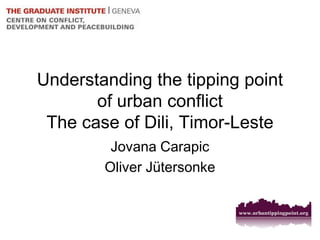
Understanding the Tipping Point of Urban Conflict: Dili
- 1. Understanding the tipping point of urban conflict The case of Dili, Timor-Leste Jovana Carapic Oliver Jütersonke
- 2. Why Dili? • The tipping point: – The “Crisis” in Dili, started in April 2006 and ended with the elections of 2007; – The death of dozens, the destruction of around 2,000 houses, and the displacement of 150,000 people. • The violence occurred in a setting marked by high youth unemployment and the presence of a variety of martial arts and rituals arts groups, as well as street-corner gangs. •While these individuals may have been involved in the escalation of violence, societal conflict emerged out of a dispute over unequal treatment within the armed forces.
- 3. A brief history of Timor-Leste • Located on the eastern half of the island of Timor • Official independence in 2002 – independence from Portugal in 1974 – Indonesian occupation from 1975-1999 – popular consultation in August 1999 (where 78.5% voted in favour of independence from Indonesia)
- 4. Contextualizing Dili • The capital, and the major urban centre of Timor-Leste, is Dili – located on the northern coast of the island – Population of around 250,000 (roughly 25% of the total population) • “Primate” and over-determined city – political and economic centre – local and international civil society – high presence of the United Nations and other development agencies
- 5. Particularities of Dili • Important features that make Dili different from the rest of Timor-Leste – heterogeneous population – weak traditional beliefs – land insecurity – a plethora of security providers • Territorial and cultural “disembeddedness” of the city
- 6. 2006-07 Crisis • Fault lines: empirically observed or perceived societal divisions along which tensions are structured and interests defined – traditional forms of authority (lisan) vs. the values of liberal democracy – distinction “easterners” and “westerners” – disembedded nature of the urban space •Conflict drivers: imminent conditions that have the potential of triggering social unrest –social jealousy –historical problems among the political elite, –high youth unemployment, –land insecurity –fragmentation in the security sector •By mapping onto the fault lines described, these conflict drivers provided the context in which key actors could exploit individual and group interests and pit them against each other.
- 7. Recommendations 1.Recognize Dili as an urban space 2.Recognize the complexity of security provision in Dili
- 8. Dili as an ‘urban’ space • Our findings suggest that Dili needs to be recognized as a genuinely urban space • In practice this means: – Building of structured public spaces – Participatory planning procedures – Municipal structures – Long-term urban plan – Building up of other regional urban centres (such as Elmera, Bacau)
- 9. Complexities of security provision • Dili is marked by the presence of a multitude of local and international, public and private, formal and informal security providers. – international forces – military (F-FDTL) and police (PNTL) – various youth groups
- 10. Dealing with complexities of security provision • Tackling security sector fragmentation could include: – creating local security forums – fostering intergroup interaction – a professional and impartial police force
- 11. Next steps • Analysing patterns of rural-urban migration; • GIS mapping of security perceptions over time; • Organizational ethnographies of formal and informal security providers.
- 12. Thank you! jovana.carapic@graduateinstitute.ch oliver.jutersonke@graduateinstitute.ch
